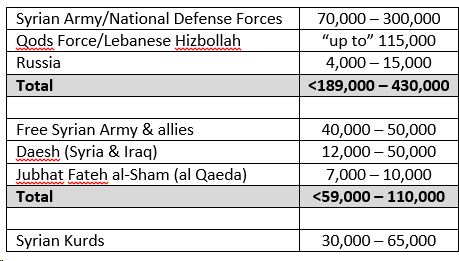 Reports of the collapse of resistance by forces fighting the regime of Bashar Al Assad in Aleppo, Syria have overshadowed news of the recent recapture of Palmyra by Daesh fighters. While the conquest of Aleppo is a significant victory for Assad, the loss of Plamyra – which had been recaptured by the Syrian Army earlier in the year – clearly indicates that success will not be decisive in bringing the five-year old civil war to an end.
Reports of the collapse of resistance by forces fighting the regime of Bashar Al Assad in Aleppo, Syria have overshadowed news of the recent recapture of Palmyra by Daesh fighters. While the conquest of Aleppo is a significant victory for Assad, the loss of Plamyra – which had been recaptured by the Syrian Army earlier in the year – clearly indicates that success will not be decisive in bringing the five-year old civil war to an end.
Despite major assistance from Russia and Iran, the Syrian Army lacks the combat power to defeat the various domestic and foreign rebel forces arrayed against it. The army, estimated to number over 300,000 before the conflict began, is now believed to total less than half of that as a result of casualties, desertions, and fatigue. It has become particularly weak in infantry. In an attempt to remedy this, the Syrians have raised religiously and politically indoctrinated National Defense Forces (NDF) militias with the help of Iranian advisors, although they are of uncertain quality. The Iranians Qods Force and Lebanese Hizbollah have contributed advisor and fighters, respectively, and the Russians have also contributed advisors and heavy artillery and air support.
Reliable estimates of force strengths for the various factions are hard to come by, and figures for the Syrian Army are particularly variable. The Syrian Kurds are currently aligned against Daesh and Jubhat Fateh al-Sham (the current name for al Qaeda fighters in Syria). They seek independence from the Assad regime but are not fighting against it at this time.

Even the most optimistic estimates based on back-of-the-envelope counts of the raw numbers do not credit the Assad regime and its patrons with enough of a force ratio advantage to overwhelm their opponents in the sort-term. If the pessimistic estimates are more accurate, despite local successes, the Syrian government may struggle simply to maintain the status quo.
During the presidential campaign, Donald Trump promised to intensify U.S. efforts effort to defeat Daesh and to work with Russia to that end. Analysts believe, however, that Russia supports Assad’s calculated strategy to defeat Syrian Sunni rebels first to eliminate the political threat they pose to his regime, before seeking to defeat Daesh and al Qaeda. Precisely what the incoming Trump administration will do differently than currently and the extent of actual military cooperation with Assad and Russia remains to be seen.
